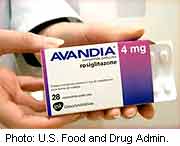
TUESDAY, July 13 (HealthDay News) — During hearings Tuesday into the safety of controversial diabetes drug Avandia, members of the U.S. government panel that could decide the drug’s fate seemed skeptical of much of the data presented.
A decision on whether to ban Avandia or not is expected Wednesday.
The hearing has coincided with news that the drug’s maker, GlaxoSmithKline, may have buried or manipulated data crucial to Avandia’s approval and continued sale.
“Can we trust the sponsor?” Dr. Ellis F. Unger, a U.S. Food and Drug Administration official, asked when referring to GlaxoSmithKline (GSK), The New York Times reported. “I think that’s something the committee is going to need to think about here,” he said.
Dr. Nancy L. Geller, a member of the FDA advisory committee and director of the Office of Biostatistics Research at the National Heart, Lung, and Blood Institute, also made her doubts known, the Times reported. “I’m just concerned about data quality overall,” she said.
When told that mortality estimates from clinical trials are generally reliable, Geller replied, “Not if you report the wrong follow-up date and not if you withdraw someone from a trial just before their death.”
Prospects have looked increasingly grim for Avandia this week. In a report released early Tuesday, the Times said that GSK knew more than a decade ago that Avandia caused an increased risk of heart problems but covered up the information.
In a 1999 trial pitting Avandia against its competitor, Actos, the drug company, then known as SmithKline Beecham, found that Avandia posed a heart risk, the newspaper reported.
The Times report, based on internal company documents the newspaper had obtained, said that the company did not post results of its drug trial findings on its Web site or submit them to federal regulators.
According to a March 29, 2001, e-mail message the Times obtained, Dr. Martin I. Freed, a company executive, wrote about the study results: “This was done for the U.S. business, way under the radar. Per Sr. Mgmt request, these data should not see the light of day to anyone outside of GSK.” GlaxoSmithKline is the corporate successor to SmithKline.
The safety of Avandia (rosiglitazone) came under U.S. government scrutiny starting Tuesday, as an advisory panel of experts began two days of hearings.
The new information released by the Times comes after new doubts surfaced last week on a key trial that helped keep Avandia on the market.
Last Friday, a medical reviewer for the U.S. Food and Drug Administration posted remarks on the agency’s Web site suggesting that GlaxoSmithKline’s “mishandling” of trial results may have masked some cardiovascular effects of Avandia.
The official’s posting was part of a safety reassessment package prepared for the FDA’s advisory panel meeting.
At issue in the review posting were the results of the landmark RECORD (Rosiglitazone Evaluated for Cardiac Outcomes and Regulation of Glycemia in Diabetes) trial, which was done by Glaxo at the FDA’s request. The results, announced in June 2009, found that Avandia raised the risk of heart failure but not to a level of statistical significance. The study also concluded that the drug did not increase the risk of cardiovascular disease or overall death.
In his posting, Thomas A. Marciniak, medical team leader of the division of cardiovascular and renal products at the FDA’s Center for Drug Control and Evaluation, said that “RECORD was inadequately designed and conducted to provide any reassurance about the [cardiovascular] safety of rosiglitazone” and that “RECORD suggests the (sic) rosiglitazone increases the risk for [heart attacks].”
Last June, Glaxo used the trial results to tout the drug’s safety.
“RECORD provides important and reassuring information about Avandia for physicians fighting diabetes,” said Dr. Ellen Strahlman, Glaxo’s chief medical officer, in a statement released at the time. “We believe that the results showed that Avandia is safe.”
On Friday, the company, in a prepared statement, said, “The RECORD study was conducted according to good clinical practices and the data are reliable. . . RECORD demonstrated that Avandia was not associated with an overall increase in cardiovascular hospitalization or cardiovascular death compared to metformin and sulfonylureas.”
According to the Times, Marciniak was on hand at Tuesday’s hearings and reiterated his doubts about RECORD. He pointed to the case of one participant in the trial whose heart attack was excised from his medical record by the doctor in charge of those materials.
“I think this type of handling of events is completely unacceptable,” Marciniak told those at the hearing.
But the researcher in charge of RECORD defended the trial’s integrity. Dr. Philip Home, professor of diabetes medicine at Newcastle University, said to panel members that contrary to the allegations in an editorial published in last week’s New England Journal of Medicine, the trial’s independent safety committee “was not compromised by GSK in 2007.”
Also on Tuesday, groups including the American Diabetes Association, the American Association of Clinical Endocrinologists and The Endocrine Society issued a joint statement advising patients who are using Avandia to hold steady for now.
“Patients should continue taking all currently prescribed medications unless instructed otherwise by their health care provider,” the experts said. “Stopping diabetes medications can result in higher levels of blood glucose that may cause serious short-term health problems and could increase the risk of diabetes-related complications in the long term.”
They added that “until further clarification is provided by the FDA, the decision whether or not to use any medication must remain that of the treating provider in direct discussion with the individual patient.”
More information
The U.S. National Library of Medicine has more on Avandia and Actos.

